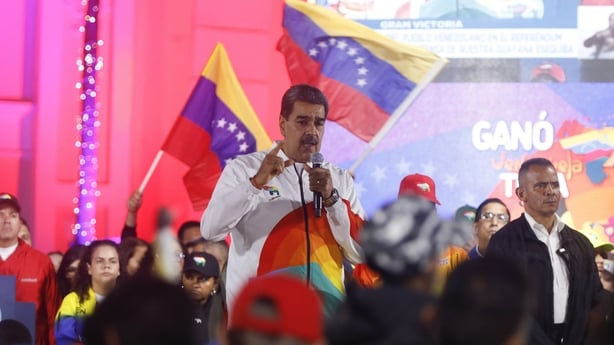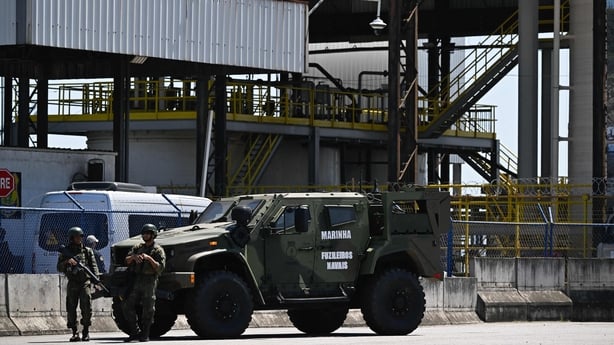The foreign ministers of Venezuela and Guyana have spoken by telephone as tensions escalated over a disputed oil-rich region, the government in Caracas said in a statement.
At the request of Guyana, its top diplomat Hugh Todd discussed with his Venezuelan counterpart Yvan Gil "to discuss the issue of the territorial dispute," said the statement, adding the parties agreed to "keep the communication channels open".
The Brazilian army, meanwhile, said it was reinforcing its presence in the northern cities of Pacaraima and Boa Vista as part of efforts "to guarantee the inviolability of the territory".
Tensions have risen as Caracas proposed a bill to create a Venezuelan province in a disputed oil-rich region and ordered the state oil company to issue licenses for extracting crude there.
Venezuela's President Nicolas Maduro proposed at a government meeting that a bill be sent to the National Assembly for the creation of a "Guyana Esequiba" province in a region Guyana has administered for over a century.
He also said oil, gas and mining licenses must be issued immediately.
Guyanese President Irfaan Ali called President Maduro's statements a "direct threat" against his country and rejected the measures announced by the Venezuelan leader.

On Sunday, Venezuela held a controversial non-binding referendum on the region's fate that yielded an overwhelming 95% "yes" vote for Caracas' designs on Essequibo, or Esequiba as it is known in Venezuela.
Mr Maduro gave an ultimatum to oil companies working under concessions given by Guyana to withdraw their operations within three months.
He also said a town bordering the disputed area, Tumeremo, would become the headquarters of Venezuelan efforts to defend its interests there, adding authorities would conduct a census and begin issuing identity cards without giving details of how that would occur.
Earlier, Guyana said it would approach the UN Security Council for help if Venezuela makes any moves following the referendum, which Guyana had sought to stop with an urgent application to the International Court of Justice (ICJ) in The Hague.
Guyana's Attorney General Anil Nandlall said: "Any action or any attempt to take any action pursuant to the referendum will necessitate a resort to the UN Security Council as an injured party."
He said Guyana would invoke Articles 41 and 42 of the UN Charter which can authorise sanctions or military action to maintain or restore international peace and security.
"In terms of military, it (the UNSC) can authorise the use of armed forces by member states to assist in the enforcement" of ICJ orders, Mr Nandlall said.
Guyana has administered Essequibo for over a century. The region makes up more than two-thirds of its territory and is home to 125,000 of Guyana's 800,000 citizens.
Litigation is pending before the ICJ over where the borders should lie.
Guyana, a former British and Dutch colony, insists the frontiers were determined by an arbitration panel in 1899.
But Venezuela, which does not accept the ICJ's jurisdiction in the matter, claims the Essequibo River to the region's east forms a natural border and had historically been recognised as such.
The dispute has intensified since ExxonMobil discovered oil in Essequibo in 2015.
Caracas called Sunday's referendum after Georgetown started auctioning off oil blocks in Essequibo in August.
Guyana had asked the ICJ to block the vote, which it considered an existential threat.
On Friday, the court urged Caracas to take no action that might affect the disputed territory, but did not grant Georgetown's request for urgent intervention.
Instead, it ruled that Venezuela "shall refrain from taking any action which would modify the situation that currently prevails in the territory in dispute".
On Sunday, Guyana's Ali warned that if Venezuela ignored the court order, "it will be a great injustice to the people of Venezuela because ultimately that path would lead to the suffering of the people of Venezuela."
Voters were asked to respond to five questions in the referendum, including whether Venezuela should reject the 1899 arbitration decision as well as the ICJ's jurisdiction.
They were also asked whether Venezuelan citizenship should be granted to the people, currently Guyanese, of a new "Guyana Esequiba State".
Brazil urges Venezuela to avoid force or threats against Guyana
Brazil rejects any use of force by Venezuela to occupy the Esequibo territory in Guyana and will urge the Caracas government not to threaten its neighbour, President Luiz Inacio Lula da Silva's top foreign policy advisor has said.
Celso Amorim, who travelled to Venezuela as Lula's special envoy last month, said that Brazil opposes "the use of force or threat thereof".
"I conveyed our very serious preoccupations," he said of his visit to Caracas ahead of a public referendum on the Esequibo.

"Now there are new facts that are still more worrisome. We'll not fail to transmit our concerns, especially in relation to the policy of no use of force," Mr Amorim said.
Brazilian Foreign Minister Mauro Vieiras dismissed the risk of an armed clash between Brazil's two neighbours on the northern border.
However, Brazil's military has reinforced the border region due to rising tensions between Venezuela and Guyana.
The Brazilian army is moving armoured vehicles and more troops to Boa Vista, the capital of Roraima state, the Defense Ministry said.
At issue is a 160,000sqkm region more than twice the size of Ireland that is mostly thick jungle.
Venezuela reactivated its claim over the Esequibo in recent years after the discovery of vast offshore oil and gas reserves.
The Esequibo has been in dispute since the 19th century when Guyana was a British colony.
An international tribunal in Paris settled the issue in 1899, but Venezuela says the decision was rigged.

